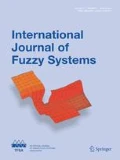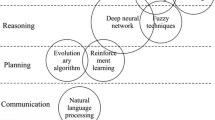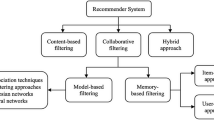Abstract
Recommender systems have been exhaustively implemented in the e-commerce industry for providing accurate, efficient, and effective personalized recommendations to candidate users. The variants of matrix factorization (MF) techniques incorporating the stochastic gradient descent (SGD) are exploited to improve the efficacy of recommender systems through effectively dealing the fuzzy behavior. The iterative update mechanism of MF-based SGD techniques involves current but limited information for providing related recommendations. The strength of sliding window and multi-innovation-based approximations with memory can improve the accuracy of the recommender systems through prior knowledge by utilizing the fuzziness among ratings. In this work, a moving-information-based computing paradigm is presented to effectively handle the fuzzy nature of preferences by recommender systems with the ability to capture the collective effect of ratings of previous update history obtained for a defined information length to provide fast and precise recommendations.
















Similar content being viewed by others
References
Aggarwal, C.C.: An introduction to recommender systems. In: Recommender Systems, pp. 1–28. Springer, Cham (2016)
Bobadilla, J., Ortega, F., Hernando, A., Gutiérrez, A.: Recommender systems survey. Knowl. Based Syst. 46, 109–132 (2013)
Heimbach, I., Gottschlich, J., Hinz, O.: The value of user’s Facebook profile data for product recommendation generation. Electron. Mark. 25(2), 125–138 (2015)
Karimi, M., Jannach, D., Jugovac, M.: News recommender systems—survey and roads ahead. Inf. Process. Manag. 54(6), 1203–1227 (2018)
Eirinaki, M., Gao, J., Varlamis, I., Tserpes, K.: Recommender systems for large-scale social networks: a review of challenges and solutions. Futur. Gener. Comput. Syst. 78, 413–418 (2018)
Amato, F., Moscato, V., Picariello, A., Piccialli, F.: SOS: a multimedia recommender System for Online Social networks. Futur. Gener. Comput. Syst. 93, 914–923 (2019)
Chamoso, P., Rivas, A., Rodríguez, S., Bajo, J.: Relationship recommender system in a business and employment-oriented social network. Inf. Sci. (Ny) 433–434, 204–220 (Apr. 2018)
Xiong, P., Zhang, L., Zhu, T., Li, G., Zhou, W.: Private collaborative filtering under untrusted recommender server. Futur. Gener. Comput. Syst. (2018)
Kaur, H., Kumar, N., Batra, S.: An efficient multi-party scheme for privacy preserving collaborative filtering for healthcare recommender system. Futur. Gener. Comput. Syst. 86, 297–307 (2018)
Hong, M., Jung, J.J.: Multi-Sided recommendation based on social tensor factorization. Inf. Sci. (Ny) 447, 140–156 (2018)
Yu, W., Li, S.: Recommender systems based on multiple social networks correlation. Futur. Gener. Comput. Syst. 87, 312–327 (2018)
Meng, S., Qi, L., Li, Q., Lin, W., Xu, X., Wan, S.: Privacy-preserving and sparsity-aware location-based prediction method for collaborative recommender systems. Futur. Gener. Comput. Syst. 96, 324–335 (2019)
Salter, J., Antonopoulos, N.: CinemaScreen recommender agent: combining collaborative and content-based filtering. IEEE Intell. Syst. 21(1), 35–41 (2006)
Pazzani, M.J., Billsus, D.: Content-based recommendation systems. In: The Adaptive Web, pp. 325–341. Heidelberg: Springer (2007)
Aslanian, E., Radmanesh, M., Jalili, M.: Hybrid Recommender Systems based on Content Feature e4Relationship. In: IEEE Trans. Ind. Informatics, pp. 1–1 (2016)
Peng, D., Yuan, W., Liu, C.: HARSAM: a hybrid model for recommendation supported by self-attention mechanism. IEEE Access 7, 12620–12629 (2019)
Köhler, S., Wöhner, T., Peters, R.: The impact of consumer preferences on the accuracy of collaborative filtering recommender systems. Electron. Mark. 26(4), 369–379 (2016)
He, C., Parra, D., Verbert, K.: Interactive recommender systems: a survey of the state of the art and future research challenges and opportunities. Expert Syst. Appl. 56, 9–27 (2016)
Chen, R., Hua, Q., Chang, Y.-S., Wang, B., Zhang, L., Kong, X.: A survey of collaborative filtering-based recommender systems: from traditional methods to hybrid methods based on social networks. IEEE Access 6, 64301–64320 (2018)
Cunha, T., Soares, C., de Carvalho, A.C.P.L.F.: Metalearning and recommender systems: a literature review and empirical study on the algorithm selection problem for collaborative filtering. Inf. Sci. (Ny) 423, 128–144 (2018)
Li, J., et al.: Category preferred canopy–K-means based collaborative filtering algorithm. Futur. Gener. Comput. Syst. 93, 1046–1054 (2019)
Koren, Y., Bell, R., Volinsky, C.: Matrix factorization techniques for recommender systems. Computer (Long. Beach. Calif). 42(8), 30–37 (2009)
Ben Schafer, J., Konstan, J.A., Riedl, J.: E-commerce recommendation applications. In: Applications of Data Mining to Electronic Commerce, vol. 5, no. 1/2, pp. 115–153. Boston, MA: Springer (2001)
Wang, J., de Vries, A.P., Reinders, M.J.T.: Unifying user-based and item-based collaborative filtering approaches by similarity fusion. In: Proceedings of the 29th annual international ACM SIGIR conference on Research and development in information retrieval - SIGIR ’06, p. 501 (2006)
Salakhutdinov, R., Mnih, A.: Probabilistic matrix factorization. In: Neural Information Processing Systems, pp. 1257–1264 (2007)
Wang, S., Tang, J., Wang, Y., Liu, H.: Exploring hierarchical structures for recommender systems. IEEE Trans. Knowl. Data Eng. 30(6), 1022–1035 (2018)
Pan, Y., He, F., Yu, H.: A novel enhanced collaborative autoencoder with knowledge distillation for top-N recommender systems. Neurocomputing 332, 137–148 (2019)
Park, M.-H., Hong, J.-H., Cho, S.-B.: Location-based recommendation system using bayesian user’s preference model in mobile devices. In: Ubiquitous Intelligence and Computing. Heidelberg: Springer, pp. 1130–1139 (2007)
Gao, L., Li, C.: Hybrid personalized recommended model based on genetic algorithm. In: 2008 4th International Conference on Wireless Communications, Networking and Mobile Computing, pp. 1–4 (2008)
Luo, X., Xia, Y., Zhu, Q.: Incremental collaborative filtering recommender based on regularized matrix factorization. Knowledge-Based Syst. 27, 271–280 (2012)
Luo, X., Xia, Y., Zhu, Q.: Applying the learning rate adaptation to the matrix factorization based collaborative filtering. Knowl. Syst. 37, 154–164 (2013)
Takács, G., Pilászy, I., Németh, B., Tikk, D.: Scalable collaborative filtering approaches for large recommender systems. J. Mach. Learn. Res. 10, 623–656 (2009)
Chin, W.-S., Zhuang, Y., Juan, Y.-C., Lin, C.-J.: A fast parallel stochastic gradient method for matrix factorization in shared memory systems. ACM Trans. Intell. Syst. Technol. 6(1), 1–24 (2015)
Zhou, Y., Wilkinson, D., Schreiber, R., Pan, R.: Large-scale parallel collaborative filtering for the netflix prize. In: Algorithmic Aspects in Information and Management, vol. 5034 LNCS, pp. 337–348. Heidelberg: Springer (2008)
Vinagre, J., Jorge, A.M., Rocha, C., Gama, J.: Statistically robust evaluation of stream-based recommender systems. In: IEEE Trans. Knowl. Data Eng., pp. 1–1 (2019)
Aslam, M.S., Chaudhary, N.I., Raja, M.A.Z.: A sliding-window approximation-based fractional adaptive strategy for Hammerstein nonlinear ARMAX systems. Nonlinear Dyn. 87(1), 519–533 (2017)
Wan, L., Ding, F.: Decomposition- and gradient-based iterative identification algorithms for multivariable systems using the multi-innovation theory. Circuits Syst. Signal Process. 38(7), 2971–2991 (2019)
Xu, L., Ding, F., Lu, X., Wan, L., Sheng, J.: Hierarchical multi-innovation generalised extended stochastic gradient methods for multivariable equation-error autoregressive moving average systems. IET Control Theory Appl. 14(10), 1276–1286 (2020)
Ding, F., Chen, T.: Multi-innovation stochastic gradient identification methods. In: 2006 6th World Congress on Intelligent Control and Automation, vol. 1, pp. 1501–1505 (2006)
Chaudhary, N.I., Latif, R., Raja, M.A.Z., Machado, J.A.T.: An innovative fractional order LMS algorithm for power signal parameter estimation. Appl. Math. Model. (2020)
Himabindu, T.V.R., Padmanabhan, V., Pujari, A.K.: Conformal matrix factorization based recommender system. Inf. Sci. (Ny) 467, 685–707 (2018)
Xu, C.: A novel recommendation method based on social network using matrix factorization technique. Inf. Process. Manag. 54(3), 463–474 (2018)
Zhu, B., Ortega, F., Bobadilla, J., Gutiérrez, A.: Assigning reliability values to recommendations using matrix factorization. J. Comput. Sci. 26, 165–177 (2018)
Bell, R.M., Koren, Y.: Scalable collaborative filtering with jointly derived neighborhood interpolation weights. In: Seventh IEEE International Conference on Data Mining (ICDM 2007), pp. 43–52 (2007)
Srebro, N., Rennie, J.D.M., Jaakkola, T.S.: Maximum-margin matrix factorization. NIPS 17, 1329–1336 (2004)
Kumar, V., Pujari, A.K., Sahu, S.K., Kagita, V.R., Padmanabhan, V.: Collaborative filtering using multiple binary maximum margin matrix factorizations. Inf. Sci. (Ny) 380, 1–11 (2017)
Hofmann, T.: Latent semantic models for collaborative filtering. ACM Trans. Inf. Syst. 22(1), 89–115 (2004)
Yu, H.-F., Hsieh, C.-J., Si, S., Dhillon, I.: Scalable coordinate descent approaches to parallel matrix factorization for recommender systems. In: 2012 IEEE 12th International Conference on Data Mining, 2012, pp. 765–774
Paterek, A.: Improving regularized singular value decomposition for collaborative filtering categories and subject descriptors. In: Proceedings of KDDCup.07, 2007, pp. 39–42
Chin, W.-S., Zhuang, Y., Juan, Y.-C., Lin, C.-J.: A Learning-Rate Schedule for Stochastic Gradient Methods to Matrix Factorization. Lecture Notes in Computer Science (including subseries Lecture Notes in Artificial Intelligence and Lecture Notes in Bioinformatics), vol. 9077, pp. 442–455. Springer, Cham (2015)
Ricci, F., Rokach, L., Shapira, B.: Introduction to recommender systems handbook. In: Recommender Systems Handbook. Springer, Boston, pp. 1–35 (2011)
Sun, R., Luo, Z.-Q.: Guaranteed matrix completion via non-convex factorization. IEEE Trans. Inf. Theory 62(11), 6535–6579 (2016)
Jin, C., Kakade, S.M., Netrapalli, P.: Provable efficient online matrix completion via non-convex stochastic gradient descent. pp. 4520–4528 (2016)
Gemulla, R., Nijkamp, E., Haas, P.J., Sismanis, Y.: Large-scale matrix factorization with distributed stochastic gradient descent. In: Proceedings of the 17th ACM SIGKDD International Conference on Knowledge Discovery and Data Mining - KDD ’11, p. 69 (2011)
Nguyen, S.-T., Kwak, H.-Y., Lee, S.-H., Gim, G.-Y.: Using stochastic gradient decent algorithm for incremental matrix factorization in recommendation system. In: 2019 20th IEEE/ACIS International Conference on Software Engineering, Artificial Intelligence, Networking and Parallel/Distributed Computing (SNPD), pp. 308–319 (2019)
Luo, X., Wang, D., Zhou, M., Yuan, H.: Latent factor-based recommenders relying on extended stochastic gradient descent algorithms. In: IEEE Trans. Syst. Man, Cybern. Syst., pp. 1–11 (2019)
Chen, P., Chen, H.H.: Accelerating matrix factorization by overparameterization. In: DeLTA 2020 - Proceedings of the 1st International Conference on Deep Learning Theory and Applications, pp. 89–97 (2020)
Vinagre, J., Jorge, A.M., Gama, J.: Fast incremental matrix factorization for recommendation with positive-only feedback. In: Lecture Notes in Computer Science (including subseries Lecture Notes in Artificial Intelligence and Lecture Notes in Bioinformatics), vol. 8538, Springer, New York, pp. 459–470 (2014)
Nasiri, M., Minaei, B.: Increasing prediction accuracy in collaborative filtering with initialized factor matrices. J. Supercomput. 72(6), 2157–2169 (2016)
Khan, Z.A., Chaudhary, N.I., Zubair, S.: Fractional stochastic gradient descent for recommender systems. Electron. Mark. 29(2), 275–285 (2019)
Khan, Z.A., Zubair, S., Chaudhary, N.I., Raja, M.A.Z., Khan, F.A., Dedovic, N.: Design of normalized fractional SGD computing paradigm for recommender systems. Neural Comput. Appl., pp. 1–18 (2019)
Khan, Z.A., Zubair, S., Alquhayz, H., Azeem, M., Ditta, A.: Design of momentum fractional stochastic gradient descent for recommender systems. IEEE Access 7, 179575–179590 (2019)
Jduchi, J.D., Singer, Y.: Adaptive subgradient methods for online learning and stochastic optimization * Elad Hazan (2011)
Zeiler, M.D.: ADADELTA: an adaptive learning rate method (2012). arXiv:1212.5701v
Hinton, G.E., Srivastava, N., Swersky, K.: Neural networks for machine learning lecture 6a overview of mini-batch gradient descent. COURSERA: Neural Networks for Machine Learning, 2012. https://www.cs.toronto.edu/~tijmen/csc321/slides/lecture_slides_lec6.pdf. http://www.cs.toronto.edu/~tijmen/csc321/slides/lecture_slides_lec6.pdf. Accessed 24 Dec 2020
Qian, N.: On the momentum term in gradient descent learning algorithms. Neural Netw. 12(1), 145–151 (Jan. 1999)
Sutskever, I., Martens, J., Dahl, G., Hinton, G.: On the importance of initialization and momentum in deep learning. In: 30th International Conference on Machine Learning, ICML 2013, No. PART 3, pp. 2176–2184 (2013)
Kingma, D.P., Ba, J.: Adam: a method for stochastic optimization. In: 3rd Int. Conf. Learn. Represent. ICLR 2015 - Conf. Track Proc. (2014)
Kingma, D.P., Ba, J.L.: Adam: A method for stochastic optimization. In: 3rd International Conference on Learning Representations, ICLR 2015 - Conference Track Proceedings (2015)
Dozat, T.: Workshop track-ICLR 2016 INCORPORATING NESTEROV MOMENTUM INTO ADAM. (2016)
Reddi, S.J., Kale, S., Kumar, S.: On the convergence of adam and beyond (2019). arXiv
Harper, F.M., Konstan, J.A.: The movielens datasets. ACM Trans. Interact. Intell. Syst. 5(4), 1–19 (2015)
Guo, G., Zhang, J., Yorke-Smith, N.: A novel bayesian similarity measure for recommender systems. In: Proc. 23rd Int. Jt. Conf. Artif. Intell., pp. 2619–2625 (2013)
Steck, H.: Evaluation of recommendations. In: Proceedings of the 7th ACM Conference on Recommender Systems - RecSys 13, pp. 213–220 (2013)
Zhang, H., Sun, Y., Zhao, M., Chow, T.W.S., Wu, Q.M.J.: Bridging user interest to item content for recommender systems: an optimization model. IEEE Trans. Cybern. 50(10), 4268–4280 (2020)
Khan, Z.A., Zubair, S., Imran, K., Ahmad, R., Butt, S.A., Chaudhary, N.I.: A new users rating-trend based collaborative denoising auto-encoder for top-N recommender systems. IEEE Access 7, 141287–141310 (2019)
Li, K., Zhou, X., Lin, F., Zeng, W., Alterovitz, G.: Deep probabilistic matrix factorization framework for online collaborative filtering. IEEE Access 7, 56117–56128 (2019)
Nguyen, D.M., Tsiligianni, E., Deligiannis, N.: Learning discrete matrix factorization models. IEEE Signal Process. Lett. 25(5), 720–724 (2018)
Kim, D., Park, C., Oh, J., Lee, S., Yu, H.: Convolutional matrix factorization for document context-aware recommendation. In: Proceedings of the 10th ACM Conference on Recommender Systems - RecSys ’16, pp. 233–240 (2016)
Lin, F., Zhou, X., Zeng, W.: Sparse online learning for collaborative filtering. Int. J. Comput. Commun. Control 11(2), 248 (2016)
Hoi, S.C.H., Sahoo, D., Lu, J., Zhao, P.: Online learning: A comprehensive survey (2018)
Xue, H.-J., Dai, X., Zhang, J., Huang, S., Chen, J.: Deep matrix factorization models for recommender systems. In: Proceedings of the Twenty-Sixth International Joint Conference on Artificial Intelligence, pp. 3203–3209 (2017)
Nguyen, D.M., Tsiligianni, E., Deligiannis, N.: Extendable neural matrix completion. In: 2018 IEEE International Conference on Acoustics, Speech and Signal Processing (ICASSP), vol. 2018-April, pp. 6328–6332 (2018)
Huang, J., Nie, F., Huang, H.: Robust discrete matrix completion. In: Proceedings of the 27th AAAI Conference on Artificial Intelligence, AAAI 2013, pp. 424–430 (2013)
Huo, Z., Liu, J., Huang, H.: Optimal discrete matrix completion. In: 30th AAAI Conference on Artificial Intelligence, AAAI 2016, pp. 1687–1693 (2016)
Singh, S., Sharma, S., Lalotra, S.: Generalized correlation coefficients of intuitionistic fuzzy sets with application to MAGDM and clustering analysis. Int. J. Fuzzy Syst. 22, 1582–1595 (2020)
Alfaro-Garcia, V.G., Merigó, J.M., Pedrycz, W., Monge, R.G.: Citation analysis of fuzzy set theory journals: bibliometric insights about authors and research areas. Int. J. Fuzzy Syst. 22(8), 2414–2448 (2020)
Liu, Y., Alcantud, J.C.R., Rodríguez, R.M., Qin, K., Martínez, L.: Intertemporal hesitant fuzzy soft sets: application to group decision making. Int. J. Fuzzy Syst. 1–17 (2020)
Safaeipour, H., Zarandi, M.F., Bastani, S.: Mapping crisp structural semantic similarity measures to fuzzy context: a generic approach. Int. J. Fuzzy Syst. 22(4), 1224–1242 (2020)
Pei, F., He, Y.W., Yan, A., Zhou, M., Chen, Y.W., Wu, J.: A consensus model for intuitionistic fuzzy group decision-making problems based on the construction and propagation of trust/distrust relationships in social networks. Int. J. Fuzzy Syst. 22(8), 2664–2679 (2020)
Author information
Authors and Affiliations
Corresponding author
Ethics declarations
Conflict of interest
All authors declared that there are no potential conflicts of interest.
Rights and permissions
About this article
Cite this article
Khan, Z.A., Raja, M.A.Z., Chaudhary, N.I. et al. MISGD: Moving-Information-Based Stochastic Gradient Descent Paradigm for Personalized Fuzzy Recommender Systems. Int. J. Fuzzy Syst. 24, 686–712 (2022). https://doi.org/10.1007/s40815-021-01177-9
Received:
Revised:
Accepted:
Published:
Issue Date:
DOI: https://doi.org/10.1007/s40815-021-01177-9




